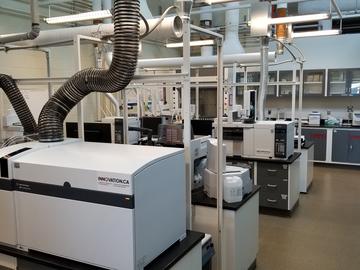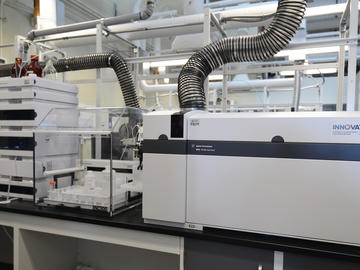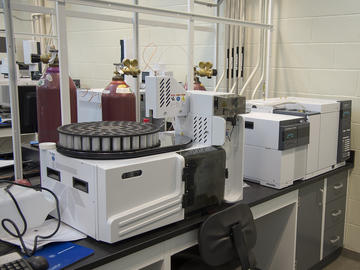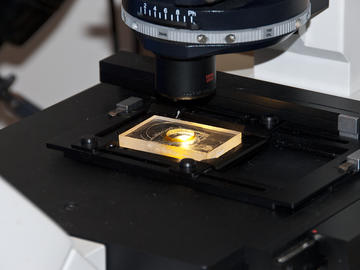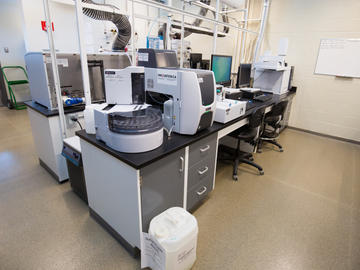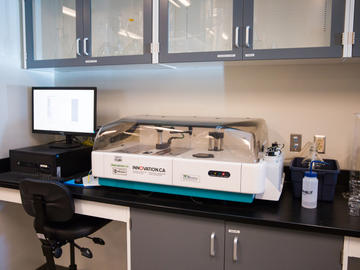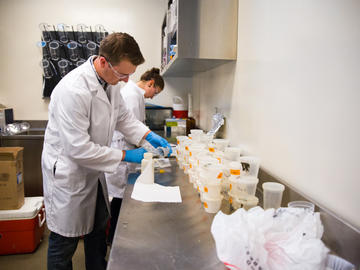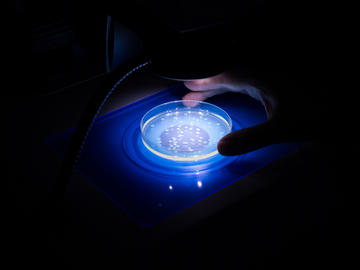Laboratories
ACWA's on-site and campus labs conduct state-of-the-art analyses and can develop new methods for clients and researchers upon request.
An on-site analytical laboratory provides state-of-the-art chemical analyses of a wide range of organic and inorganic compounds, including detailed wastewater characterization. The lab team has developed several new analytical methods for low concentration compounds in challenging wastewater matrices, including:
- cannabinoids,
- pharmaceuticals and hormones,
- nitrosamines and phthalates, and
- targeted industrial compounds.
Access to on-campus labs provides aquaria for detailed ecotoxicological studies, microbiology and gene sequencing and stable isotope tracing analyses. New methods can be developed as required.
Laboratories
The primary laboratory for the ACWA Research facility is located at the Pine Creek Wastewater Treatment Centre (WWTC). This laboratory enables researchers to perform a full range of organic and inorganic analyses, including the analysis of trace elements. The laboratory has the capacity to analyze the molecular characteristics of wastewater and treated effluents with more in-depth analyses performed at the Microbiology Laboratory.
Located in the Operations & Maintenance Building, the ACWA Laboratory is adjacent to the City's process laboratory. The proximity of these two laboratories facilitates the sharing of expertise and technology transfer between researchers and the personnel responsible for the operations of the City's WWTC.
The ACWA Pine Creek Analytical Laboratory contains four functional areas and houses $4.1 Million in analytical equipment, including:
- A complete suite of gas chromatographs (GC) with the following detection systems:
- electron capture detector (ECD)
- flame ionization detector (FID)
- nitrogen and phosphorus detector (NPD)
- and mass spectrometer (MSD)
- Triple quad liquid chromatograph-mass spectrometer system (LC-MS)
- Quantitative time of flight, liquid chromatograph-mass spectrometer (QToF LC-MS)
- High performance liquid chromatograph (HPLC)
- Inductively coupled plasma triple quad mass spectrometer (ICP-MS)
- Ion Chromatograph (IC)
- A full range of instruments necessary to perform standard tests, including
- Total organic carbon (TOC)
- Biological oxygen demand (BOD)
- Chemical oxygen demand (COD)
- Microbiology laboratory with extensive culture facilities for microorganisms, diagnostic tools, and basic molecular analysis tools. This laboratory compliments the Microbiology Laboratory, which houses more advanced instruments for detailed analyses
ACWA Lab Contact
Darina Kuzma
darina.kuzma@ucalgary.ca
403-210-7333 / 403-210-7301
The controlled environment of the Aquatic Laboratory is an integral component of the ACWA facility and allows for the optimization of the ACWA Research Streams.
The Aquatic Laboratory, located on the main University of Calgary campus, is used to perform controlled experiments and develop valid assays to test the effects of various chemical mixtures prior to conducting full-scale experiments at the Pine Creek site. These results are essential to an understanding of the mechanisms of toxicity and the design of follow up large-scale experiments utilizing the ACWA Research Streams.
The Aquatic Laboratory houses a state-of-the art fish holding facility and experimental tanks, and has access to analytical equipment. The Aquatic Laboratory enables experiments using different fish species. The laboratory has a reverse osmosis system to produce the high-quality water necessary to undertake experiments with controlled trace concentrations of biologically active compounds, pharmaceuticals, and other chemical mixtures of concern.
The ACWA Microbiology Laboratory, located at the University of Calgary Health Science Centre, is used to characterize the molecular mechanisms of antimicrobial resistance and transmission, and support enteric pathogen diagnostics and surveillance in wastewaters. This laboratory is a joint use facility accessed by researchers from the Faculty of Veterinary Medicine and the Cumming School of Medicine at the University of Calgary. Collaborators from other Canadian Universities, the Alberta Provincial Laboratory for Public Health (ProvLab), Calgary Laboratory Services and the Public Health Agency of Canada also have access to the facilities.
The facilities are capable of investigating the full range of pathogens (bacteria, parasites and viruses) found in wastewaters. The laboratory houses analytical equipment, including:
- Standard and quantitative real-time PCR cyclers
- DNA sequencer
- Electrophoresis documentation system
- -80oC storage
- Microtiter plate reader
- Biosafety hood
The current director of the ACWA Microbiology Lab is Dr. Dongyan Niu, an Associate Professor from Faculty of Veterinary Medicine. She also holds an adjunct position at the Department of Microbiology, Immunology and Infectious Diseases, Cumming School of Medicine.
The Isotope Science Laboratory, located on the University of Calgary campus, houses equipment capable of identifying the sources and tracing the fate of pollutants such as nitrate, ammonium, and phosphate. The existing Isotope Science Laboratory has expanded to accommodate two new isotope ratio mass spectrometers (IRMS) with several peripheral devices. Sample preparation is performed at the ACWA facility, with samples being transported to the university campus for further measurement, gas preparation and subsequent isotope ratio determinations.
The Isotope Science Laboratory houses an additional $1.4 million of state-of-the-art analytical equipment, including isotope-ratio mass spectrometry (IRMS) for compound-specific carbon and nitrogen isotope measurements and laser-based ringdown cavity spectrometers for isotope measurements on water, CO2 and CH4. The two new IRMS complement four existing IRMS instruments capable of hydrogen, oxygen and sulphur isotope analysis on a wide variety of solid, liquid, and gaseous samples. The Isotope Science Laboratory at the University of Calgary is currently one of the largest and most versatile modern stable isotope laboratories in Canada.


